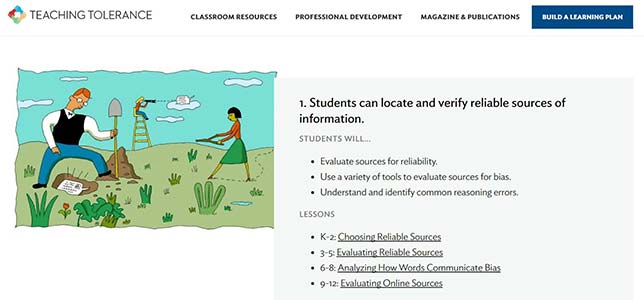Teaching Tolerance Offers K-12 Digital Literacy Lessons
- By Dian Schaffhauser
- 11/07/17

An organization focused on reducing prejudice and supporting equitable school experiences for all students is pointing educators to a set of resources that will help them teach digital literacy in their schools.
Teaching Tolerance, a project of the Southern Poverty Law Center, has defined digital literacy as a kind of "civic literacy," enabling people to identify faulty information online, participate meaningfully in online communities, resist malevolent forces online, use the internet for good and understand the online landscape.
The timing isn't simply coincidental. The organization noted the "plethora of new information on just how damaging fake news can be to democracy." By providing the free K-12 lessons, the project said it hopes to outfit teachers to help their students "become better consumers and disseminators of online information."
The "Teaching Tolerance Digital Literacy Framework" covers seven areas where students need to develop their digital and civic literacy skills:
- Locating and verifying reliable sources of information by being able to evaluate them for reliability and bias;
- Understanding how digital information comes to them through search algorithms;
- Engaging constructively in digital communities by showing inclusivity and empathy during group communications and calling out bias or hate;
- Grasping how their online activities affect privacy and security by being able to monitor their digital footprint and knowing how to stay safe online;
- Knowing how to produce or remix content for sharing;
- Recognizing their roles as customers in online marketplaces; and
- Identifying how to use the internet "as a mechanism of civic action."
Each area has a set of lessons separated by grade band: K-2, 3-5, 6-8 and 9-12. The lessons all cover objectives, essential questions, materials, vocabulary, procedures, a map to related Common Core standards and a shortlist of external links to useful sites. The site also includes a professional development module and webinar on getting ready to teach digital literacy with activities designed to help teachers refresh their understand of digital literacy.
"Teaching Tolerance's mission is to educate students for a diverse democracy. We want students to find strength in diversity, recognize injustice and learn how to take informed action," said Director, Maureen Costello, in a prepared statement. "Their ability to navigate the digital space and use it productively is a key skill. They can use technology to build community and make change, or they can absorb misinformation and hate delivered to their devices. We think digital literacy is essential for our diverse democracy to thrive."
The digital literacy site is available on the Teaching Tolerance website.
About the Author
Dian Schaffhauser is a former senior contributing editor for 1105 Media's education publications THE Journal, Campus Technology and Spaces4Learning.